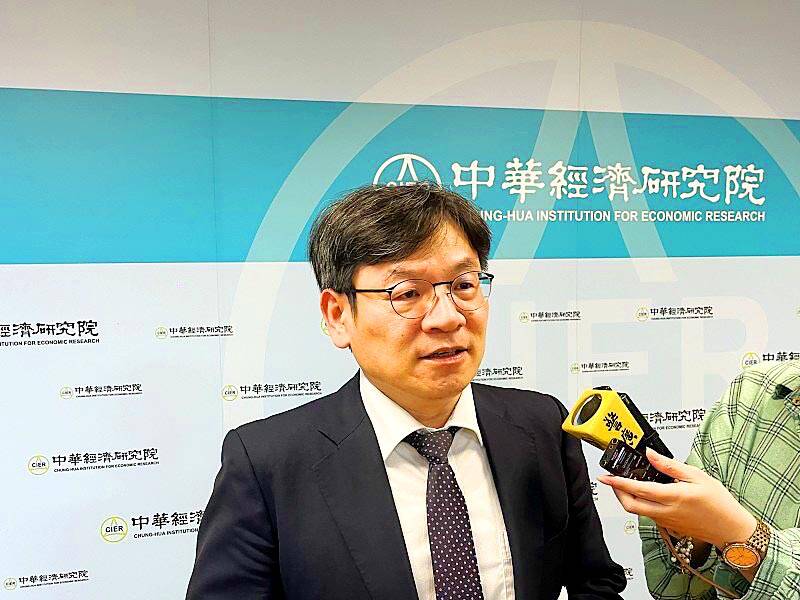Chung-Hua Institution for Economic Research (CIER, 中華經濟研究院) yesterday raised its forecast for Taiwan’s GDP growth from 3.1 percent to 3.38 percent, as exports could receive a bigger boost from global artificial intelligence (AI) demand.
“The nation’s exports would start to set sail from this quarter, thanks to better order visibility,” CIER president Yeh Chun-hsien (葉俊顯) said.
Exports, the main growth driver that accounts for 60 percent of GDP, would shift from a 9.8 percent decline last year to a 7.89 percent increase this year, as inventory adjustments come to a close, the think tank said.

Photo: Hsu Tzu-ling, Taipei Times
The low base last year would also help and explain why the recovery momentum would ease off quarter by quarter, Yeh said.
GDP growth is predicted to reach 5.57 percent last quarter, and to slow to 3.55 percent this quarter, 3 percent next quarter and 1.66 percent in the final quarter, he added.
Global AI demand has been stronger than expected and would ramp up businesses of local tech firms on its supply chain, Yeh said.
Revenue from AI server chips would more than double this year and would account for 20 percent of overall sales by 2028 from a contribution that is currently in the low teens, Taiwan Semiconductor Manufacturing Co (TSMC, 台積電) told investors on Thursday.
Yeh said the upward revision also aims to reflect an increase in government expenditure that would expand 2.68 percent this year to build up national defense and armament procurements.
Private consumption would register a healthy 2.09 percent gain, falling from an 8.32 percent uptick, as demand for outbound travel holds sturdy, especially after an earthquake which measured a 7.2 on the Richter scale jolted Hualien on April 3 and is expected to hinder tourism in eastern Taiwan, Yeh added.
CIER has a dim view on private investment, saying that the GDP component would shrink 0.2 percent this year after a deep 11.6 percent retreat last year.
Local firms remain cautious about capital spending, as the US Federal Reserve appears unlikely to cut interest rates anytime soon and Taiwan’s central bank last month unexpectedly raised borrowing costs by 0.125 percentage points, Yeh said.
Sticky inflation and spiking geopolitical tensions lent support to a conservative approach, he added.
CIER is looking at an inflation of 2.3 percent, which is above the central bank’s 2 percent alarm, mitigating little from a 2.49 percent rise last year.

TARIFFS: The global ‘panic atmosphere remains strong,’ and foreign investors have continued to sell their holdings since the start of the year, the Ministry of Finance said The government yesterday authorized the activation of its NT$500 billion (US$15.15 billion) National Stabilization Fund (NSF) to prop up the local stock market after two days of sharp falls in reaction to US President Donald Trump’s new import tariffs. The Ministry of Finance said in a statement after the market close that the steering committee of the fund had been given the go-ahead to intervene in the market to bolster Taiwanese shares in a time of crisis. The fund has been authorized to use its assets “to carry out market stabilization tasks as appropriate to maintain the stability of Taiwan’s

STEEP DECLINE: Yesterday’s drop was the third-steepest in its history, the steepest being Monday’s drop in the wake of the tariff announcement on Wednesday last week Taiwanese stocks continued their heavy sell-off yesterday, as concerns over US tariffs and unwinding of leveraged bets weighed on the market. The benchmark TAIEX plunged 1,068.19 points, or 5.79 percent, to 17,391.76, notching the biggest drop among Asian peers as it hit a 15-month low. The decline came even after the government on late Tuesday authorized the NT$500 billion (US$15.2 billion) National Stabilization Fund (國安基金) to step in to buoy the market amid investors’ worries over tariffs imposed by US President Donald Trump. Yesterday’s decline was the third-steepest in its history, trailing only the declines of 2,065.87 points on Monday and

TARIFF CONCERNS: The chipmaker cited global uncertainty from US tariffs and a weakening economic outlook, but said its Singapore expansion remains on track Vanguard International Semiconductor Corp (世界先進), a foundry service provider specializing in producing power management and display driver chips, yesterday withdrew its full-year revenue projection of moderate growth for this year, as escalating US tariff tensions raised uncertainty and concern about a potential economic recession. The Hsinchu-based chipmaker in February said revenues this year would grow mildly from last year based on improving supply chain inventory levels and market demand. At the time, it also anticipated gradual quarter revenue growth. However, the US’ sweeping tariff policy has upended the industry’s supply chains and weakened economic prospects for the world economy, it said. “Now

Six years ago, LVMH’s billionaire CEO Bernard Arnault and US President Donald Trump cut the blue ribbon on a factory in rural Texas that would make designer handbags for Louis Vuitton, one of the world’s best-known luxury brands. However, since the high-profile opening, the factory has faced a host of problems limiting production, 11 former Louis Vuitton employees said. The site has consistently ranked among the worst-performing for Louis Vuitton globally, “significantly” underperforming other facilities, said three former Louis Vuitton workers and a senior industry source, who cited internal rankings shared with staff. The plant’s problems — which have not